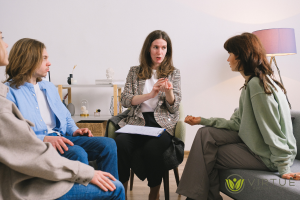Key Takeaways
- Group therapy provides people with opioid addiction a sense of connection and support, reducing feelings of isolation.
- Modern opioid treatment in Las Vegas includes both medical care and peer-based therapies.
- Sharing experiences in a group setting can improve coping strategies and reduce relapse risk.
- Combining group sessions with other therapies builds a stronger, more balanced recovery plan.
- Access to professional treatment near you is key to long-term recovery.
Introduction
Opioid addiction is often described as a lonely disease. Many people who struggle with dependency find themselves withdrawing from friends, family, and social settings. Over time, this isolation can deepen the emotional and physical toll of addiction. But there is hope. Today, opioid treatment in Las Vegas is no longer just about detoxing; it’s about rebuilding lives with a focus on connection, community, and mental wellness. Group therapy, in particular, plays a major role in helping individuals feel less alone in their journey. When combined with medical support and counseling, these programs give people the tools they need to heal in an environment where they feel understood.Why Does Isolation Play Such a Big Role in Opioid Addiction?
One of the biggest challenges in opioid use disorder is the sense of separation it creates. Addiction can drive people to hide their struggles, avoid loved ones, or distance themselves from social situations. Research highlights that prolonged isolation not only worsens emotional pain but also increases the chances of relapse. That’s why treatment programs now emphasize community-based approaches. When someone enters substance abuse treatment near you, they are no longer expected to carry the weight of recovery alone. Instead, they gain access to supportive environments that encourage openness and trust.
How Can Group Therapy Help in Opioid Treatment?
Group therapy is one of the most effective tools in addressing opioid addiction. Unlike individual sessions, group settings allow participants to hear stories that mirror their challenges. This shared experience fosters trust, empathy, and accountability. A 2019 study found that people in group recovery settings reported lower stress and improved long-term sobriety outcomes. For many, knowing they are not alone can make the difference between relapse and resilience. Facilities offering group therapy often combine these sessions with medical detox, one-on-one counseling, and wellness activities. This creates a more comprehensive recovery plan that treats the whole person, not just the addiction.What Role Does Peer Support Play in Recovery?
Peer support can be transformative. Listening to someone who has walked a similar path builds hope and motivation. Many individuals in recovery say hearing real-life experiences helped them believe that change was possible. These sessions also provide space to practice communication skills, develop healthier relationships, and learn new ways of coping with cravings or stress. According to a 2021 review, peer-based interventions significantly improve emotional regulation and treatment retention. By engaging in opioid treatment in Las Vegas that emphasizes group support, individuals not only learn from professionals but also from peers who understand the struggle firsthand.
How Do Group Programs Fit with Other Treatment Options?
Group sessions are most effective when paired with other therapeutic approaches. Medical detox, for instance, addresses the physical challenges of withdrawal, while individual counseling works on personal triggers. Group therapy complements these by providing social reinforcement and accountability. Many facilities combine group work with mindfulness practices, cognitive behavioral therapy, and family involvement. When structured this way, recovery programs address every layer of addiction: body, mind, and community. This integrated approach is what makes programs like substance abuse treatment near you so valuable.YouTube Insight: Opioids, From Medicine to Madness
This video highlights how prescription opioids, once widely used in medicine, can quickly spiral into dependence. It also shows how treatment, especially when combined with group support, can help people regain control. For anyone seeking recovery, the message is clear: addiction doesn’t have to be a lifelong sentence, and group therapy can play a crucial role in breaking the cycle.Conclusion
Overcoming opioid addiction requires more than just willpower; it requires connection. Isolation may fuel the problem, but community-centered care can heal it. By joining opioid treatment in Las Vegas programs that include group therapy, people can find strength in shared stories and build healthier futures together. If you or a loved one is ready to take the next step, reach out to Virtue Recovery Las Vegas today or call 866-520-2861. Compassionate support is just a call away.How Can Functional Medicine Approaches Enhance Group Opioid Treatment in Las Vegas?
A functional medicine approach enriches group opioid treatment in Las Vegas by addressing underlying health issues contributing to addiction. By focusing on individualized care, nutrition, and lifestyle changes, this methodology fosters a supportive environment, enhancing recovery and promoting emotional well-being for patients seeking to overcome opioid dependency.
FAQs
What makes group therapy different from individual counseling?
Group therapy allows participants to share and learn from peers, while individual counseling focuses more on personal issues in a one-on-one setting. Both are important for recovery.Can group therapy prevent relapse?
Yes, studies show that group support lowers stress and helps build coping strategies, which can reduce the chances of relapse.Is group therapy confidential?
Absolutely. Like individual sessions, group therapy follows strict confidentiality rules so participants feel safe opening up.How long do group therapy sessions last?
Sessions typically run for about one to two hours, depending on the treatment program and structure.Can family members join group therapy?
Some programs offer family group therapy sessions to help rebuild trust and improve relationships at home.Resources
- Tracy, K., & Wallace, S. P. Benefits of peer support groups in the treatment of addiction, 2021. https://pmc.ncbi.nlm.nih.gov/articles/PMC8215831/
- Kelly, J. F., et al. Group therapy for substance use disorders: Evidence and outcomes, 2019. https://pubmed.ncbi.nlm.nih.gov/30797382/
- Alexander, M. J., & Bowen, A. Peer support in recovery from addiction, 2005. https://pubmed.ncbi.nlm.nih.gov/16110222/









